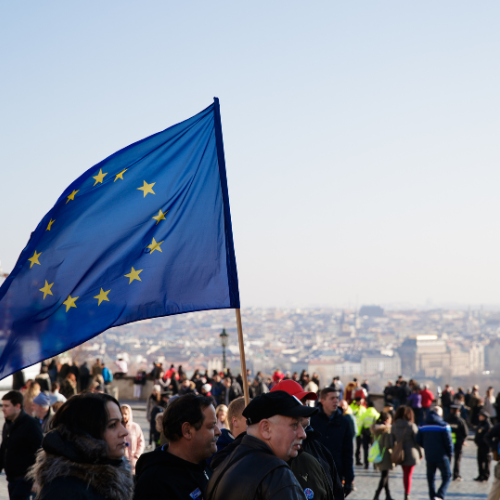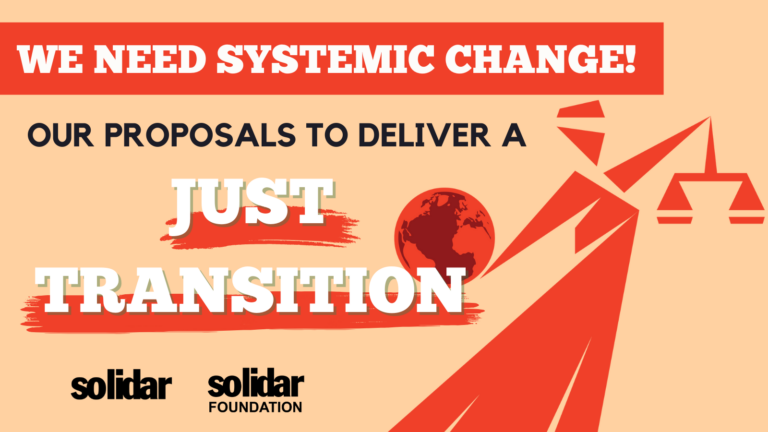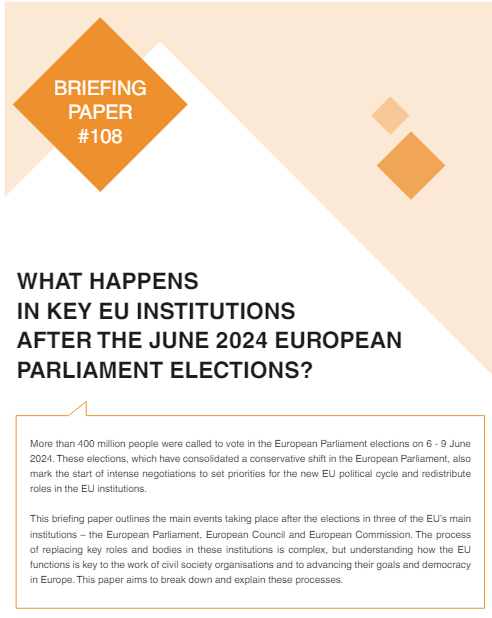Europe’s Next Chapter: Balancing Prosperity, Sustainability, and Social Justice
At the European Parliament’s constituent plenary session in July 2024, Ursula von der Leyen was re-elected President of the European Commission. She then got to present her new Political Guidelines, a document based on the European Council’s Strategic Agenda that sets out the priority areas on which the Commission will focus and, in broad terms, the main policies and steps that the Commission intends to take to ensure that it achieves its new political objectives. In the context of heightened geopolitical tensions, rising inequalities, and fears of economic decline, how can Europe strike the right balance between prosperity, sustainability, and social justice?
EU Social Policy: We Need Ambitious Measures and Funding to Enhance Our Social Model
The Political Guidelines point out that the European Pillar of Social Rights is a key instrument to protect the European social model and ensure access to social rights for all. To this end, the document announces a new Action Plan for the Implementation of the European Pillar of Social Rights. This is excellent news as it confirms the intention of the new Commission to keep the implementation of the EPSR high on the agenda. However, its quality and ambition will depend on the concrete initiatives attached to it, and the funding made available at EU and national level. Moreover, the EPSR should also be a beacon for the EU’s enlargement process.

Positive signals can be seen in the Commission’s commitment to work on a European Affordable Housing Plan and an EU Anti-Poverty Strategy. The housing crisis and the fight against poverty must be absolute priorities, and SOLIDAR therefore welcomes the related initiatives presented in the Guidelines. At the same time, doubts remain about the comprehensive and ambitious nature of such measures; regrettably, no reference is made to the fight against the root causes of homelessness or to adequate minimum income schemes.
More generally, it is still very unclear how the self–proclaimed “Investment Commission” will ensure that extraordinary social investments will be mobilised to meet the exceptional challenges brought by the ongoing green and digital transitions given that the austerity approach was re-affirmed in the reform of the EU’s economic governance rules.
A vision of how to continue to support the social and solidarity economy, as well as references to a wellbeing economy are notably absent, even though they are key to the essential paradigm shift we need to build more sustainable and equitable societies.
EU Migration Policy: We Must Uphold Fundamental Rights
It is telling for the perspective of this new Commission that the sections dealing with migration are found in the chapter ‘A new era for European Defence and Security’, demonstrating a resolutely security-oriented perspective on migration. With this approach, the President of the Commission proposes measures that will mostly contribute to limit the fundamental rights of migrants.
Among other things, the President reiterated her commitment to implementing the EU Pact on Migration and Asylum, a substantial blow to the right to asylum. The Commission will also step up the work on returns, find new ways of tackling irregular migration and crack down on smugglers, something we know from previous experience is commonly used to justify policies that criminalise migrants and the people who help them. Labour migration and inclusion of migrants barely get a nod, and are mentioned only when they serve economic interests.
On the (few) positive sides, Ursula von der Leyen mentions the opening of legal pathways, a certain priority. It is also very welcome that she calls for more transparency towards the European Parliament on migration agreements with third countries, as it is essential for sound migration governance . Finally, the President also recognises the need to ensure that migrant workers have good working conditions and are not exploited.

Just Transition: The Green Transition and Social Justice Should Be Addressed Together
The Political Guidelines provides a framework for advancing the green transition and a framework for improving social justice across Europe. However, these two agendas remain largely disconnected, reflecting a lack of vision on how social issues and climate action are intertwined. This disconnection undermines the goal of achieving a truly “just green transition.”
Climate action is now part of the competitiveness agenda and falls under the umbrella of a new European Prosperity Plan, which aims to ensure the growth of EU businesses through measures to deepen the EU’s single market, support low-carbon industrial production and the uptake of digital technologies. Specific plans for the 2024-2029 mandate include:

- A Clean Industrial Deal, complementing the European Green Deal, to support competitive EU industry and clean technologies;
- A binding 90% emission reduction target for 2040;
- An Industrial Decarbonisation Accelerator Act to channel investment into decarbonising heavy industry, especially energy-intensive sectors, and clean energy infrastructure;
- A Circular Economy Act to help to create market demand for secondary materials and a single circular market for waste, especially critical raw materials;
- A European Climate Adaptation Plan to help Member States prepare and plan, and to ensure regular science-based risk assessments.
The social dimension of the green transition remains vague and underdeveloped. No major legislative initiative on just transition has been announced, and unfortunately, the concept is framed primarily in terms of how it contributes to competitiveness. There are a few highlights: SOLIDAR welcomes the proposed development of a Quality Jobs Roadmap in collaboration with social partners, aimed at ensuring fair wages, good working conditions, access to training, and fair job transitions for people, in particular by extending the scope of collective bargaining. We also welcome the announcement of a significant increase in funding for just transition in the next Multiannual Financial Framework, though further details of what this will actually mean are to be announced at a later stage.
EU Foreign Policy: From Development Cooperation to Economic Competitiveness
The Guidelines announced a new economic foreign policy based on three pillars: 1) Economic security to boost European competitiveness; 2) Deepening free and fair-trade relations with partners around the world, including the development of Clean Trade and Investment Partnerships and on critical minerals and raw materials. 3) Investing in partnerships through the Global Gateway, the EU’s initiative to invest in infrastructure projects around the world.

The promotion of European economic interests emerges as the central objective of this new European foreign policy. Development cooperation policy – whose primary objective is the reduction and, in the long term, the eradication of poverty – has almost no place in these Guidelines, and the Global Gateway seems to become its only operational tool.
According to SOLIDAR, the grant-based programmes of NDICI-Global Europe should remain the core of the EU’s international cooperation, while the loans of the Global Gateway should be rethought to ensure that they contribute to sustainable development and a socially just green transition in partner countries. Moreover, civil society and trade unions should be recognised as genuine partners and civic space should be promoted globally.
In the context of “geostrategic rivalries”, SOLIDAR believes that it is in the EU’s interest to promote collaboration rather than competition, line with the promotion of a just and inclusive rules-based world order.
On a positive note, the Guidelines acknowledges the need for “Europe to play a leading role in reforming the international system” and to promote “a more equitable representation for all regions and tackle questions linked to development and debt”. Moreover, there is a clear acknowledgement of the EU’s responsibility to “listen and respond better to the concerns of our partners impacted by European legislation, in particular those linked to the European Green Deal” and to assess the impact of its legislation on non-EU countries, while providing assistance to help them adapt to and benefit from it.
SOLIDAR welcomes this approach and believes that it should be extended to all EU policies, including trade and industrial policies, in line with the commitments on Policy Coherence for Sustainable Development.
Finally, a comprehensive EU-Middle East strategy is announced for ‘the day after’ the war in Gaza. This strategy must guarantee the rebuilding of Gaza and Beirut, the application of international law and ensure justice for the victims of the ongoing war, as well as promote the recognition of the State of Palestine and the territorial integrity of Lebanon..
SOLIDAR supports this commitment and will work with the European Commission to ensure that all political and legal means are used to move in this direction.
Education policy and lifelong learning should serve personal and societal development, not only labor market needs
The Political Guidelines rightly stress the importance of the major changes facing our societies and the need to equip people to navigate them. This is the main idea behind the launch of a Union of Skills, that promote “all levels of skills and all types of education and training”. SOLIDAR welcomes this initiative and is keen to contribute to its design, governance and implementation. It is high time to adopt a comprehensive strategy for a lifelong learning approach to education, and we trust that the Union of Skills will take it on board and make the necessary investments.

However, beyond this proposal, the Political Guidelines seems to focus mainly on supporting the needs of the labour market to sustain EU’s economic growth, rather than on people and their ability to navigate fast-paced changing societies. There is a lack of attention to transversal competences and, surprisingly, no mention of the European Education Area. The latter is the strategic framework for coordinating Member States’ efforts in education policy based on common objectives. Given its importance for national education policies, it is disappointing to see that the Political Guidelines is void of any forward-looking for this fundamental EU strategy, nor how it would create synergies with the Union of Skills.
Similarly, we appreciate the recognition of the importance of education in achieving most of the strategic elements of the Political Guidelines. Nevertheless, it remains unclear whether the same emphasis will be placed on investment that the sector needs – investments that the sector needs. This relates to support for infrastructures, including digital ones, increasing the teaching workforce and further their competences, improving working conditions, and provide adequate support for both formal, non-formal and informal learning. While the Guidelines quite clearly puts the needs of the labour market first in terms of education, SOLIDAR is convinced that it is crucial to uphold and further the wider purpose of education and lifelong learning, so that not only professional but also personal development and the full participation in society is made possible.
Protecting civic space: We need an EU Civil Society Strategy
Over the last five years, civic space has continued to shrink in Europe and worldwide. Various monitoring reports on civic space published by CIVICUS, European Civic Forum, European Civil Liberties, as well as SOLIDAR’s own Social Rights Monitor, highlight its rapid decline largely due to restrictive measures taken by public authorities.
It is therefore encouraging that this is partially recognised in the Political Guidelines Ursula von der Leyen promises to consolidate the Rule of Law Report and to ensure that “it looks at all issues across Europe”. In addition, the political guidelines emphasises the importance of strengthening collaboration with civil society organisations (CSOs) and citizens, particularly in the context of solving societal issues and upholding human rights. The guidelines also contains the proposal to establish a Civil Society Platform.
These efforts are all welcome, however, we at SOLIDAR want to see the Commission go further and call for the development of a comprehensive civil society strategy that promotes civil participation, implements civil dialogue, and involves CSOs as key partners in EU policy-making processes. We call for the involvement of CSOs in the co-designing of the Civil Society Platform to ensure that it constitutes step towards the creation of a structured civil dialogue at EU level.

Furthermore, we would like to see these efforts reflected in the EU’s external relations, by recognising the key role of civil society in partner countries, and by defending civic space, democracy, and human rights as a central elements of the EU’s external action. We will closely follow closely the announced developments announced to strengthen the civic space and the participation of CSOs civil society organisations in the policy-making process, with the hoping that the Commission goes will move beyond words and takes concrete steps to ensure the creation of an EU wide Civil Society Strategy and reach an agreement on the structured civil dialogue during over the next five years.





